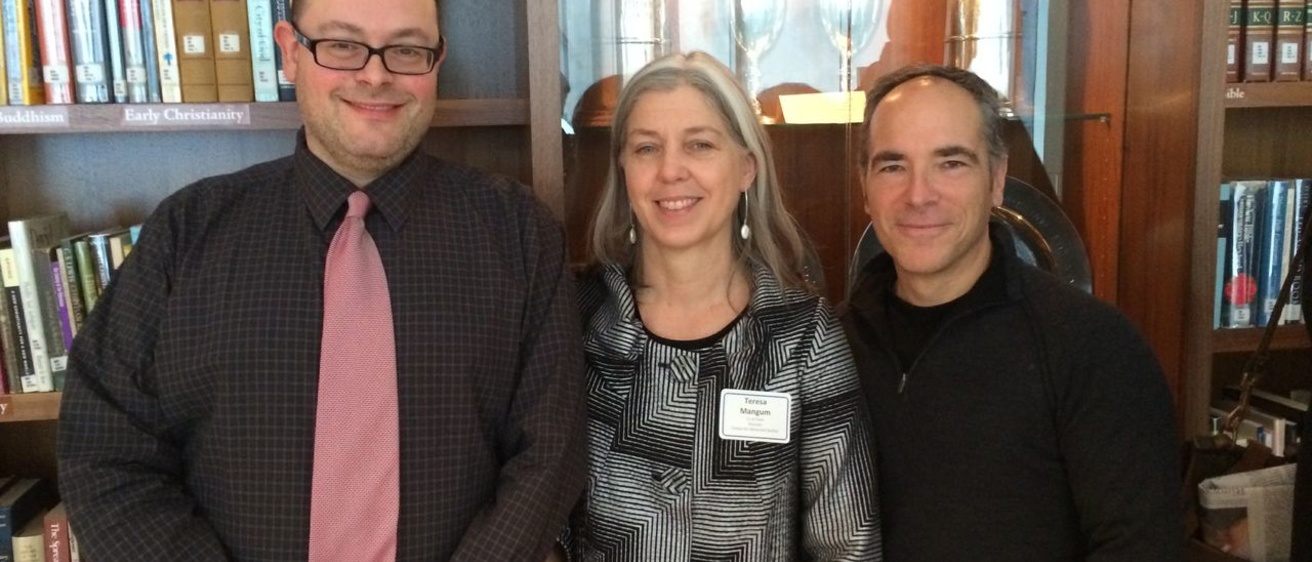The following reflections on the recent Chicago Humanities Summit were written by H. Glenn Penny (History, CLAS), who was one of several University of Iowa faculty members in attendance.
On January 9, 2014 the Chicago Humanities Festival (CHF) joined forces with the Modern Language Association (MLA), the American Academy of Arts & Sciences (AAAS), and local humanities centers along with the Obermann Center for Advanced Studies to host the Chicago Humanities Summit at the Fourth Presbyterian Church Gratz Center in Chicago.
Shifting the National Discourse on the Humanities
The Summit was inspired by “The Heart of the Matter,” a 2013 report commissioned by the United States Congress to underscore the importance of the humanities in American education, culture, national security, and global competitiveness. Matti Bunzl, Artistic Director of the CHF (pictured left with Teresa Mangum and Glenn Penny), gathered some 200 directors of humanities institutes, professors, college deans, and university presidents to shift the national discourse away from the woeful pronouncements of the “crisis of the humanities” and toward actions that leaders in higher education can take to highlight the humanities’ central position in American society and culture.
Participants included leaders in the humanities: Marianne Hirsch (MLA President), Don Randel (Chair of the Board, AAAS), the Mayor of Chicago (and former dance major), Rahm Emanuel, our own Teresa Mangum, Director of the Obermann Center, and Professors Lena Hill (English, CLAS) and H. Glenn Penny (History, CLAS). All three are members of the UI Humanities Advisory Board.
The opening panelists—John Rowe (Co-Chair of the AAAS Commission & Former CEO of Exelon), Richard Brodhead (Co-chair of the AAAS Commission & President of Duke), and the Honorable Judge Diane Wood, Seventh Circuit U.S. Court of Appeals, and, as she stressed, a former English major—outlined ways to build on the report. They also highlighted the value of exposing young people to different forms of cultural knowledge. As Judge Wood pointed out, there are many IT jobs available to young people today, but most careers still require communication and creativity (including many of those IT jobs).
Quietly Part of Our Daily Lives
The panelists noted that “the humanities” are quietly a vital part of our daily lives. People care about expression: they flock to public music and theater festivals. The knowledge gained through studying languages, literatures, histories, philosophy, religion, and the arts exists not only in the academy, libraries, and museums. Our understanding of diverse cultures has a critical impact on decisions ranging from research funding and foreign aid to declarations of war. They argued that the notion we cannot afford the humanities is a fallacy; rather, we cannot afford to deny students the humanities—in elementary, secondary, and higher education. Indeed, if we fail to incorporate the humanities and social sciences into their education, we deprive them of essential intercultural and communications skills.
Elevating the public profile of the humanities, however, requires collaborations among scholars and the larger public. In eight how-to-sessions, participants discussed creative ways to move the humanities into public spaces and to engage with broader communities. Topics included how to communicate beyond the academy; teach public humanities; use digital humanities; share the humanities on a regional scale; start a humanities festival; work with state humanities councils; build relationships with foundations; and write successive grants.
Role of Humanities Councils
At the session on working with state humanities councils, for example, Esther Mackinstosh, President of the Federation of State Humanities Councils (and a native Iowan), explained the work of Councils, which support public humanities events and activities in nearly every city and small town in the country. Councils vary in significant ways from state to state and can be valuable partners with academic humanists who want to engage broader publics. Our students come from those communities and return to them. They are, in many ways, the greatest resource for building and perpetuating working relationships with broader publics. In another session, Mangum and Matti Bunzl, Artistic Director of the CHF, shared their experiences in collaborating with local cultural institutions, coaching presenters, and capturing public attention—critical ingredients of a successful humanities festival.
The meeting concluded with a panel featuring Michael Bérubé (Pennsylvania State University) and Cathy Davidson (Duke University). They noted that the term humanities may resonate less than its component parts—including anthropology, arts, history, languages, literature, music, philosophy, religious studies, and theater. Whatever language we use, the Summit made a strong case that it is time for scholars in the humanities to take a leadership role in demonstrating, to a variety of publics, that the humanities have essential contributions to make to the state, the society, and quality of our lives.
